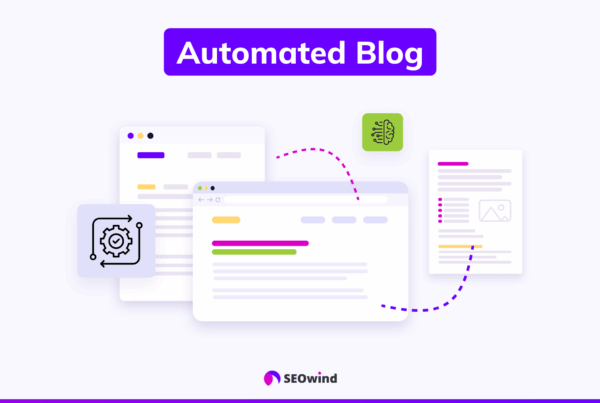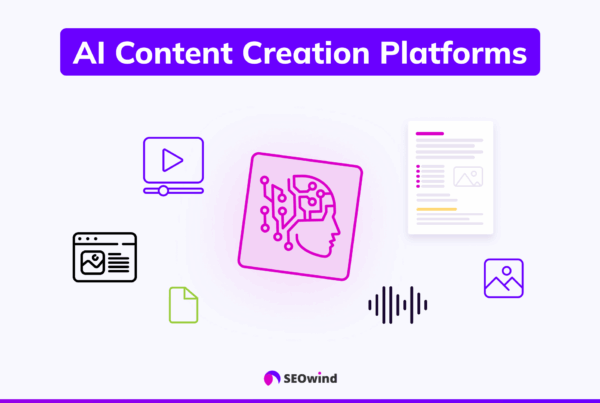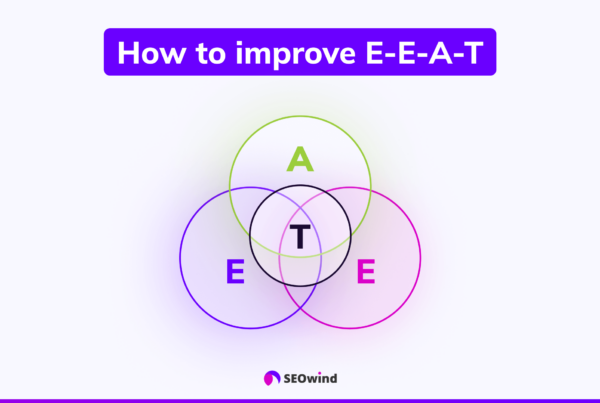Creating an engaging affiliate marketing blog can be a lucrative and fulfilling endeavor. With ever-increasing online shopping trends, there’s no better time to establish your affiliate marketing presence. Mastering the art of blogging for this purpose will open up new revenue streams while providing readers with valuable content they’ll love to consume. In this comprehensive guide, we’ll explore what affiliate marketing is, its benefits and downsides, best practices for creating an influential affiliate marketing blog, and much more. Let’s dive into the world of blogging for affiliate marketing and unleash your potential earnings.
What is Affiliate Marketing?

Affiliate marketing is a performance-based digital marketing strategy wherein businesses reward affiliates – individuals or other entities – for generating leads or sales through their promotional efforts. Essentially, affiliates promote products or services on behalf of advertisers or brands by incorporating unique referral links within their content (such as articles or social media posts). The Affiliate earns a commission when visitors click these links and complete the desired action (e.g., purchasing a product or signing up for a newsletter).
In simpler terms, think about it as if you’re promoting your favorite brand’s products to your friends: every time someone buys a product using your reference, you receive compensation.
The beauty of an affiliate program lies in its win-win nature—brands see increased exposure and conversions. In contrast, affiliates earn passive income from their loyal audience. Moreover, since most affiliate programs have a performance-driven structure based on clicks, sign-ups, or referral purchases, parties only pay when meaningful results are achieved.
This ingenious arrangement has led to substantial growth in recent years—a trend expected to continue well into the future. By cultivating an engaged following through captivating content and strategic promotion of special offerings relevant to their niche market segment—bloggers can amplify their earnings tenfold without compromising editorial integrity or readers’ trustworthiness.
Getting Started with Affiliate Blogging

Embarking on your affiliate marketing journey can be an exciting but overwhelming experience. Understanding the process and finding the best path for you, whether as an advertiser/brand or as an affiliate, is critical in ensuring a successful and profitable outcome. The following sections break down how one should approach starting in this industry.
For Advertisers/Brands
- Define Your Goals: Like any business venture, establishing clear goals for your affiliate marketing program is crucial. Consider desired revenue, customer acquisition targets, expanding brand reach, and improved web traffic.
- Select the Right Affiliates: Partnering with affiliates who resonate with your target audience is essential to drive relevant leads. Research potential partners by exploring their content, examining their followers’ demographics, monitoring engagement levels, and verifying their reputation.
- Implement Tracking Solutions: Employing tracking tools ensures you accurately measure performance metrics from referral links. Popular options include Google Analytics and various dedicated Affiliate tracking software platforms.
- Set Up an Attractive Commission Structure: Offer financially appealing rewards to encourage high-performing affiliates to join your program and maintain their loyalty over time. Remember industry averages or competitor rates when deciding on your commission model (e.g., the fixed percentage per sale or lead).
- Provide Support: Offering resources such as promotional banners, unique discount codes, product images, and data-driven insights helps optimize collaboration between you and your affiliates.
- Regularly Assess Your Program’s Performance: Keep an eye on ongoing analytics to understand which partners are driving results effectively – consider adjusting strategies or incentives accordingly.
For Affiliate Marketers
- Identify Your Niche: Choose a subject area that aligns with your passion and expertise while also meeting market demand to increase credibility and profitability.
- Create Quality Content: Develop engaging blog posts, videos, or social media updates relevant to your niche audience. Strike the right balance between informational and entertaining content. Consistently producing high-quality material will attract new followers and maintain existing ones.
- Select Appropriate Products or Services: Partner with brands offering products or services related to your niche, ensuring their offerings align with your audience’s interests and needs.
- Evaluate Affiliate Programs: Assess potential programs based on factors like commission rates, payment terms, tracking capabilities, the support provided by advertisers, and overall reputation within the industry.
- Build Your Online Presence: Utilize social media platforms such as Facebook, Instagram, or Twitter alongside your Blog for affiliate marketing efforts since they provide affordable ways to reach vast audiences.
- Learn SEO (Search Engine Optimization) Techniques: Implementing effective SEO strategies helps improve organic search rankings—resulting in increased web traffic and eventual conversions from customers arriving at your content through search engines.
Entering the affiliate marketing world may seem daunting initially, but taking a systematic approach when starting as an advertiser/brand or Affiliate significantly increases the chances of success. Research thoroughly while staying committed to creating quality content and relationships can help ensure long-lasting achievements within the industry.
Is Blogging good for Affiliate Marketing?

Yes, a blog can be an excellent platform for promoting affiliate products and marketing. Many successful affiliates have turned to blogging as their preferred product and service promotion method. There are several reasons why blogs are great platforms for affiliate marketing:
Opportunities for Creating High-Quality Content
One of the main advantages of using a blog for affiliate marketing is that it allows you to create high-quality content that educates, entertains, and informs your readers. By providing valuable information to your audience, you’ll establish yourself as an authority in your niche over time.
You can promote specific products or services and provide helpful tips and insights through well-researched and thoughtfully-written articles or posts. This approach builds trust among your audience and encourages them to follow your recommendations.
SEO Advantages
Another reason blogs are suitable for affiliate marketing is their potential for search engine optimization (SEO). With proper keyword research and target keywords – such as “blogging and affiliate marketing” or “best blog sites for affiliate marketing” – it’s possible to rank higher on search engine results pages (SERPs) organically. This organic ranking ultimately drives more targeted traffic to your site.
Moreover, by creating relevant, up-to-date content that addresses common questions within your niche, you can potentially attract backlinks from reputable sources – further improving your website’s authority and visibility.
Building Relationships with Your Audience
Blogs offer an interactive space where you can engage with readers directly through comments or social media shares. These interactions allow you to receive feedback and build long-lasting relationships that, over time, result in loyal customers who come back repeatedly looking for fresh content or recommendations from someone they already trust.
As you reply promptly and genuinely care about helping them solve their problems or answer their questions, a sense of camaraderie starts flourishing between you both, making them eager to trust your advice.
Easy to Share on Social Media
Lastly, another key benefit of using a blog for affiliate marketing is the ease with which your content can be shared across multiple social media platforms. This increased exposure allows you to reach a broader and more diverse audience – increasing the chances that any given post might resonate with those potentially interested in buying the products or services you recommend.
In summary, blogs are excellent platforms for affiliate marketing due to their ability to create valuable content, the potential for SEO optimization, opportunities for building relationships with readers, and adaptability within today’s highly-connected world where social media offers an additional channel to gain visibility.
Do I need to Blog to do Affiliate Marketing?
While blogging is a popular and effective approach for affiliate marketing, you can successfully leverage this income-generating strategy in other ways. Diversifying your methods can help reach a wider audience and increase overall revenue. Here are some alternative approaches that work well alongside blogging or on their own:
- Social media: Platforms like Instagram, Facebook, and Twitter allow you to share engaging content regularly with your followers while incorporating affiliate links organically. Just follow each platform’s guidelines for disclosing relationships with advertisers.
- YouTube Channel: Creating video content allows you to connect with your audience more personally while also providing them with valuable information on products or services related to your industry. Include affiliate links in the video description and mention them verbally during the video.
- Podcasts: Hosting a podcast affords ample opportunities for affiliate marketers because it builds trust and authority within the industry, serving as an influential voice among listeners. You can include mentions of affiliate products in conversation or dedicate entire episodes to reviewing specific items relevant to your niche.
- Email newsletters: Building an email list is one of the most potent assets any digital marketer can possess. By sending out high-value content periodically via a newsletter or autoresponder series, you can subtly share affiliate links perfect for specific consumer pain points.
- Webinars and online courses: Offering educational webinars or workshops on topics that align closely with your affiliate products helps solidify expertise in readers’ eyes while directing potential customers toward desirable solutions through links embedded within presentation materials or resources provided afterward.
Ultimately, establishing a successful career in the affiliate marketing business does not require starting a blog—although many find it helpful due to its ability to offer informative product reviews and build long-lasting reader loyalty—but instead requires persistence and versatility in exploring various platforms and strategies. This adaptability not only increases revenue potential but also allows for continuous learning and growth within the competitive landscape of digital entrepreneurship.
What Type of Blog is Best for Affiliate Marketing?
When it comes to affiliate marketing, choosing the right type of Blog can be crucial for success. Some blogs perform better in generating income and attracting a specific audience. To set yourself up for success, here are some key factors to consider when determining the best type of Blog for your affiliate marketing endeavors.
Niche-focused Blog
A niche-focused blog targets a specific market and addresses its unique interests, needs, or challenges. Concentrating on a particular topic or niche allows you to demonstrate expertise and develop credibility with potential consumers.
- Benefits:
- Improved engagement with a targeted audience
- Increased chances of conversion (affiliate sales)
- Opportunities for cross-promotion within the same niche
- Examples: travel gear reviews, healthy recipes, tech gadget comparisons
How-to/resource-focused Blog
These blogs provide detailed guides and resources about various subjects. They focus on offering practical solutions by showcasing step-by-step instructions or recommending tools required to achieve desired outcomes.
- Benefits:
- Enhances your authority as an expert by providing helpful content
- Attracts motivated visitors looking for problem-solving insights
- Encourages higher click-through rates due to targeted keywords searches
- Examples: DIY home improvement tutorials, web design software guidebooks, gardening hacks
Review-centered Blog
As the name suggests, review-centered blogs highlight comprehensive evaluations of products or services relevant to their chosen industry. These sites meticulously analyze features and specifications before presenting unbiased opinions influencing purchasing decisions.
- Benefits:
- Establishes trust among readers through honest assessments
- Allows easy integration of affiliate links within genuine recommendations
- Increases organic traffic from search engines driven by consumer inquiries
- Examples: skincare product appraisals, high-quality headphone overviews, pet supply rundowns
Lifestyle-inspired Blog
Lifestyle-inspired blogs center around living a specific life or embracing a particular set of values. They incorporate multiple topics, often based on personal interests and experiences.
- Benefits:
- Humanizes your Blog by sharing relatable stories
- Enables diverse affiliate partnerships across various industries
- Cultivates an engaged and loyal reader community
- Examples: sustainable fashion tips, fitness advice for busy professionals, parenting hacks for eco-conscious families
Ultimately, the best type of Blog for affiliate marketing should be tailored to your passions, strengths, and knowledge. Choosing a topic or category that resonates with you will make you more likely to connect with your target audience authentically and engagingly.
Do Affiliate Blogging Make Money Online?

The answer to this question is a resounding yes. Many bloggers and businesses earn significant revenue through affiliate marketing on blogs. This income-generating strategy takes time, effort, and dedication to thrive but can be highly lucrative when executed effectively. The key lies in creating valuable content that gives your audience real value while promoting suitable products or services that they will likely find beneficial. Let’s explore how successful affiliate marketers’ blogs generate money online and reveal the profit potential.
How do Affiliate Blogs Earn Revenue?
Affiliate marketing works by earning commissions from promoting other companies products or services through unique tracking links embedded in a blog’s content. When readers click these links and make purchases, the blogger earns a commission for selling affiliate products at no additional cost to the buyer.
Here are some standard methods through which affiliate blogs earn money:
- Blog posts: Integrate product or service recommendations within high-quality, informative articles for your readers.
- Reviews: Publish detailed product reviews comparing various options with pros and cons to help your audience make informed purchasing decisions.
- Tutorials: Create how-to guides demonstrating how particular products solve problems or improve specific aspects of your target audience’s lives.
What Determines Profitability in an Affiliate Blog?
While some affiliates merely scrape by, others experience substantial success earning six-figure revenues. Below are factors influencing an affiliate website or blog’s profitability:
- Niche selection: Choosing a profitable niche is essential as it directly impacts commission rates, competition level, and potential audience size.
- Audience trust: Building credibility among your target market is crucial since their willingness to buy based on your recommendations determines commission earnings.
- High-quality content: Engaging, valuable content drives traffic and encourages visitors to take action on recommended products.
- SEO optimization: Effective search engine optimization helps rank higher in search results, attracting more organic traffic with purchase intent.
Successful Examples of Affiliate Marketing Blogs
To illustrate the potential for profitability in an affiliate blog, some well-known names have set a benchmark with their affiliate income-generating prowess. These blogs earn thousands to millions of dollars in annual commissions:
- Smart Passive Income: Pat Flynn shares blogging strategies, marketing techniques, and affiliate opportunities, earning a significant part of his $2 million+ annual affiliate revenue.
- Niche Pursuits: Spencer Haws provides resources on creating niche websites and generating passive income streams through affiliate marketing, earning several thousand dollars monthly.
Remember that achieving success and making money online with an affiliate marketing blog takes time and dedication. Still, the potential rewards can be impressive when approached methodically and strategically. With hard work and consistency in promoting relevant products while delivering high-quality content to your readership, there’s certainly money to be made through affiliate blogs.
Top Affiliate Marketing Blogs on Strategies to Boost Their Revenue
Affiliate marketing blogs are valuable resources for affiliates keen on boosting their revenue.
I’ve researched top-notch affiliate marketing blogs, including each Blog’s primary focuses and how they can help you enhance your affiliate marketing strategy.
Adsterra Affiliate Marketing Blog
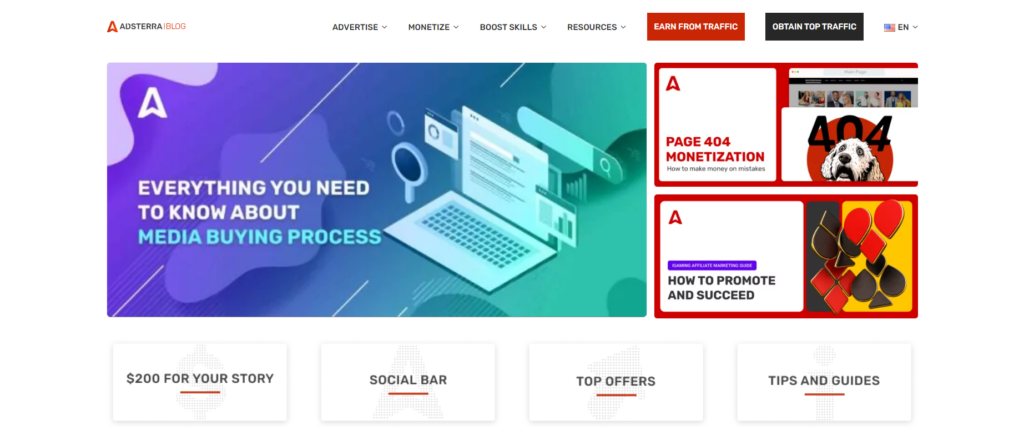
Adsterra is well-known in affiliate marketing for its ad network and traffic monetization services. Their Blog offers valuable tips and insights on various aspects of affiliate marketing, with particular emphasis on creating engaging ads that secure conversions and maximize profits for website owners.
Adam Enfroy

Adam Enfroy’s self-named Blog stands out as a comprehensive resource honing in on practical techniques to scale online businesses. The site focuses primarily on blogging strategies, SEO optimization, online entrepreneurship, and digital marketing tactics that can enable successful affiliations with websites seeking partners or promoters.
Authority Hacker – Gael Breton And Mark Webster

In Authority Hacker, Gael Breton and Mark Webster share hands-on advice to become efficient internet marketers. They disclose detailed information regarding creating high-impact content, promoting scalable niche sites, maximizing search engine visibility, and crafting growth-centered sales funnels that attract buyers while retaining loyal customers.
BloggersIdeas

Through BloggersIdeas, Romancing Blogging & Digital Marketing evangelist Jitendra Vaswani imparts expert knowledge geared toward enhancing website monetization via comprehensive tutorials discussing:
- Conversion rate optimization
- SEO know-how
- Email marketing recommendations
- Social media integration solutions
- Product reviews of contemporary affiliate-centric tools
BloggersPassion

Anil Agarwal’s creative brainchild – BloggersPassion – is an insightful platform addressing content-rich tactics specifically relevant to bloggers looking to grow their earnings from ad networks & affiliated partnerships.
BloggingWizard

Founded by prominent blogger Adam Connell, BloggingWizard offers promising affiliate marketing opportunities with robust strategies and tips centered around unearthing earnings from content creation and blog publicity.
Diggity Marketing – Matt Diggity

Diligently compiled by veterans like SEO expert Matt Diggity, the repository of articles found within DiggityMarketing.com houses revered know-how about:
- Keyword research
- Backlink strategies
- Site audits
- Competitor analysis
DollarSprout

Boomtown! Media co-founders Ben Hubert & Jeff Proctor propelled DollarSprout into existence to share their extensive knowledge on leveraging the internet for hustle-free income-building ventures—including monetizing blogs with the help of affiliate marketing alliances.
Easy Affiliate
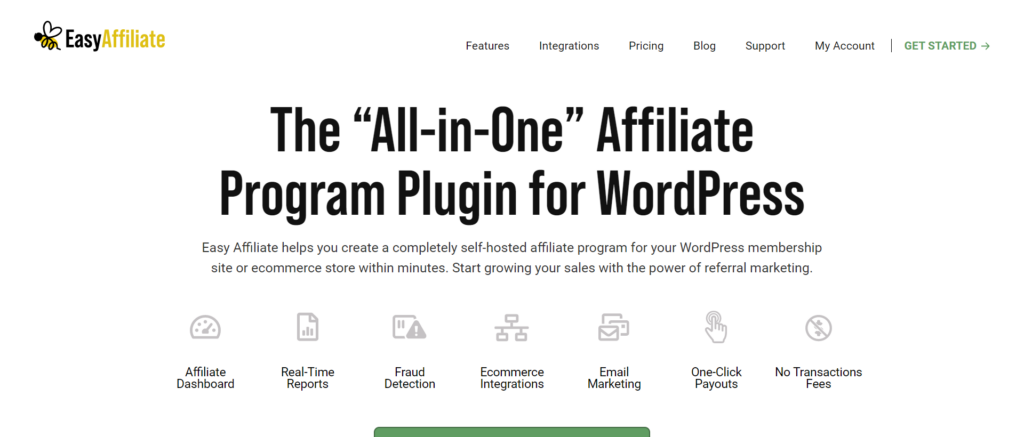
Easy Affiliate‘s informative Blog features enlightening posts covering essential elements crucial in nurturing profitable affiliations between online content creators & brands seeking promotional partnerships through performance-based incentives.
HubSpot’s Blog

Renowned for its cutting-edge inbound marketing software offerings—HubSpot’s Blog provides comprehensive information on everything affiliate marketers need, from tips on creating high-quality content to crafting detailed analytics reports focused on solidifying revenue streams from blogging efforts.
I Am Attila
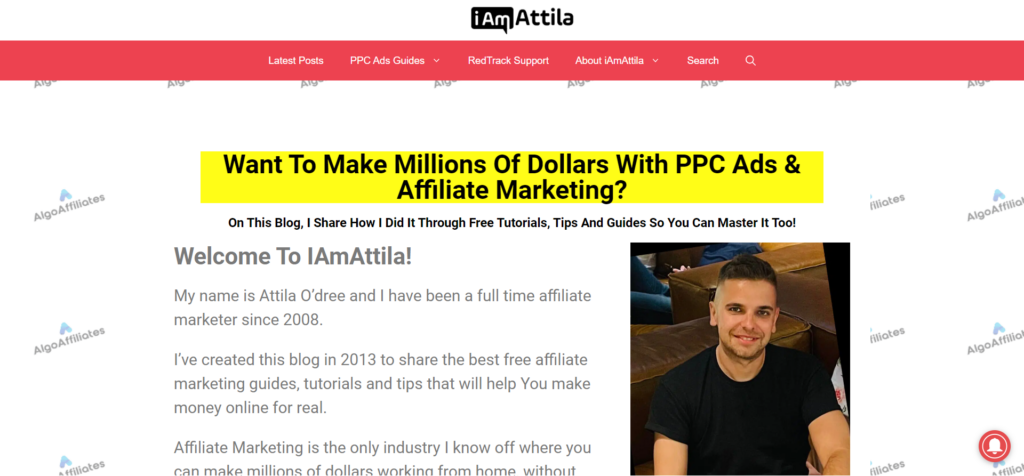
Attila O’dree, better known as “I Am Attila,” is an accomplished affiliate marketer who offers actionable advice on his Blog. This self-titled platform dispenses insights into various aspects of the affiliate marketing game, such as campaign optimization and industry trends. What makes his Blog so engaging is Attila’s unmatched track record of results-driven strategies, coupled with his easy-to-follow advice – perfect for beginners delving into the world of online business.
John Chow

John Chow has undoubtedly earned himself a top spot among the best affiliate marketing blogs today. Known for transforming his humble beginnings into a multi-million-dollar empire through blogging, he generously shares tips on generating passive income streams on johnchow.com. The simplicity with which John articulates complex ideas attracts readers from all experience levels who want to increase their earnings potential via effective online marketing.
MarketSplash

MarketSplash offers insightful content related to digital marketing, with a strong focus on affiliate marketing. The Blog provides expert advice and actionable ideas aimed at helping affiliates scale their businesses through innovative strategies.
Matthew Woodward – Search Logistics

Matthew Woodward’s Blog is an excellent resource for SEO techniques, case studies, income reports, and in-depth tutorials covering a range of topics within the realm of affiliate marketing. Its comprehensive resources make it invaluable for those wishing to boost their revenue from online ventures.
Missy Ward

As co-founder of Affiliate Summit Corporation, Missy Ward brings her extensive industry experience to her eponymous Blog. A well-respected figure in the affiliate marketing field, she shares valuable insights into numerous areas like social media optimization and event networking.
Mobidea Academy

The Mobidea Academy offers cutting-edge content tailored specifically toward mobile affiliates. Through extensive guides, video tutorials, and fresh news updates from around the globe, Mobidea helps affiliates master the ever-evolving mobile market landscape.
Neil Patel’s Blog

Neil Patel‘s widely renowned Blog delivers rich information on content creation, search engine optimization (SEO), and conversion rate optimization (CRO), along with crucial advice about affiliate marketing success—both strategic approaches and analytical techniques—to help you grow your business online.
Niche Site Project – Doug Cunnington
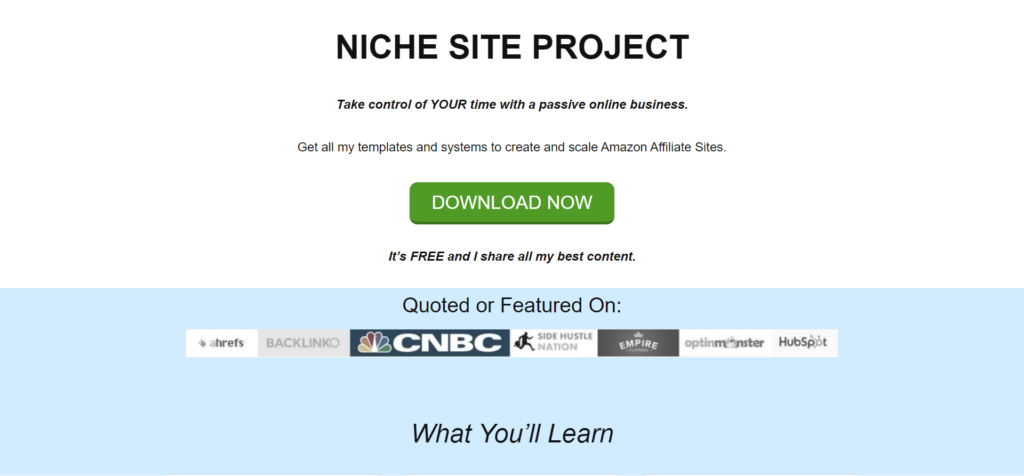
For anyone looking to build profitable niche websites around specific topics or industries, look no further than Doug Cunnington’s Niche Site Project. He divulged valued step-by-step processes for building niche websites, establishing such sites, generating traffic, and the strategies for converting passive income.
Ryan Robinson

Ryan Robinson‘s insightful Blog focuses on the growth aspect of online businesses. It provides helpful advice about driving website traffic, creating engaging content marketing strategies, running email campaigns, and diversifying income sources using affiliate marketing techniques.
Shawn Collins (Affiliate Marketing Blog)

Shawn Collins has been an influential figure in the affiliate marketing industry for over two decades. As one of the founders of Affiliate Summit Corporation, he shares knowledge in his Blog from various perspectives like publishers/affiliates and advertisers seeking insight into how best to work together profitably.
ShoutMeLoud

Named “Shouters Who Inspire” by its creator Harsh Agrawal, ShoutMeLoud is dedicated to providing technological know-how on subjects such as Affiliate Marketing to SEO. The detailed guides presented here will equip you with the tactics necessary to succeed with both operating blogs and earning additional income.
Smart Passive Income Blog (Pat Flynn)

The Smart Passive Income Blog offers valuable insights from Pat Flynn—successful entrepreneur and author—where he unveils tips that allow readers incremental earnings without significant effort through affiliate programs. You can explore tried-and-tested approaches imparted directly by someone acclaimed industry-wide for his expertise.
Semrush’s Blog
Semrush’s Blog sets itself apart by offering comprehensive SEO tactics explicitly tailored toward affiliates looking to improve their site traffic and visibility. Featuring articles authored by industry experts, you can expect trusted advice encompassed by real-life case studies that make learning enjoyable – regardless if you’re new in the field or skilled at optimizing your content already!
Spencer Haws (Niche Pursuits)
As the name suggests, Niche Pursuits by Spencer Haws focuses on finding unique niches, allowing his readers to develop individual income streams that are lesser-known yet profitable. Constantly updated with informative tips and case studies to start niche websites, this Blog is excellent for those ready to embark on a niche discovery quest.
Stream SEO
Stream SEO boasts an impressive array of in-depth analytical content best suited for affiliates striving to increase their revenue through SEO optimization. Author Luqman Khan’s extensive experience in the field ensures credible advice on keyword research, organic traffic growth, and analyzing data for better decision-making – making it indispensable among affiliate marketing blogs.
Sugarrae Blog
The Sugarrae Blog serves as a hub of inspiration and knowledge for those looking to learn affiliate marketing successfully. Here, Rae Hoffman shares her wealth of expertise backed up by personal experiences with pertinent insights into the world of SEO and online business development.
ThirstyAffiliates
ThirstyAffiliates presents itself as a trove of practical advice specifically catering to bloggers who want to monetize their sites using the power of affiliate links. Newcomers and seasoned affiliates will delight in its treasure chest with actionable strategies emphasizing optimization while adhering to strict ethical standards.
Yaro Starak Blog

Yaro Starak has earned his place among the best affiliate marketing blogs with his innovative approach toward passive income generation. Sharing captivating stories from both personal experience and fellow entrepreneurs’, Yaro. The Blog attracts countless visitors eager for insightful guidance beyond standard articles on affiliate marketing, blurring boundaries between inspiration and action-packed knowledge.
Zac Johnsons
Zac Johnson’s Affiliate Blog is a go-to resource for affiliates seeking proven strategies to boost their revenue. The Blog offers practical tips and insights to help affiliate marketers up their game and achieve greater campaign profitability.
How do I write an affiliate marketing blog?
Writing an engaging and successful affiliate marketing blog can be rewarding and profitable. However, it requires time, effort, and some essential steps to ensure your audience keeps coming back. The following guidelines will help you kick-start your journey as an affiliate blogger:
Choose a Niche
For an influential blog for affiliate marketing, start by selecting a niche that interests you, is profitable, and has ample room for growth. It’s vital to target specific segments of the market that are less saturated or underserved.
Conduct Keyword Research
Invest time in keyword research to discover which terms related to your chosen niche have high search volume but low competition. Tools like Google Ads’ Keyword Planner or SEMrush can help you identify these profitable keywords efficiently.
Create High-Quality Content
Your Blog should contain high-quality content that provides valuable information, solves problems, or entertains readers while incorporating targeted keywords naturally:
- Write well-researched articles enriched with data.
- Incorporate infographics and videos.
- Use visual aids such as images and charts.
- Engage readers by using storytelling techniques.
Consistently Publish New Posts
Regularly publish new content on your Blog – this keeps your readers engaged and signals search engines that your website is active and relevant.
Optimize Your Blog for SEO
Incorporate relevant on-page SEO practices into each affiliate blog post:
- Integrate focused keywords within title tags, headers (H1-H6), description tags, and image alt texts.
- Employ internal linking strategies between various pages of your site.
- Make sure to maintain a fast-loading website with a mobile-friendly design.
Promote Your Affiliate Products
Take advantage of different methods to promote your chosen affiliate products:
- Write comprehensive product reviews containing pros/cons and personal experiences.
- Create tutorials or “how-to” posts that seamlessly incorporate your affiliate products.
- Share stories, personal experiences, or case studies displaying the benefits of your affiliate products.
Build Relationships with Your Audience
Engagement forms the core of a successful affiliate marketing blog. Besides creating content to attract readers, interacting with them is crucial:
- Encourage comments on your posts and respond promptly.
- Utilize social media to communicate effectively.
- Develop an email list to send valuable information and updates.
Network with Other Bloggers
Connecting with fellow bloggers can pave the way for guest posting opportunities, collaboration, skills development, and exposure to new audience segments.
By incorporating these strategies, you will be on your way to creating a successful affiliate marketing blog that generates revenue while providing value to its readers. Remember that patience is critical. As long as you remain consistent in your efforts, success will eventually follow.
How to Write an Effective Affiliate Marketing Post?
An effective affiliate marketing post is essential to drive traffic to your offers and generate revenue. Knowing how to create compelling content that captures the audience’s attention while promoting the products or services you endorse is critical. This section will outline some key steps for crafting a successful affiliate marketing blog post.
Research and Identify Your Target Audience
Before starting your writing process, it’s crucial to know who your target audience is. This information will help you tailor the content to their needs, preferences, and interests. Start by:
- Defining your ideal reader demographics (e.g., age, gender, location)
- Identifying their pain points and challenges
- Learning about their favorite platforms and communication channels
Choose Relevant Products or Services
Choose high-quality products or services that align with your niche and target audience’s needs. Be selective when picking items for promotion – ensure they are relevant, valuable, and reliable. Conduct thorough research on available options within your industry before deciding which ones suit your readers best.
Develop a Catchy Title
A captivating title is often the first thing potential readers notice about your blog post. An enticing title should be informative, concise, and relevant throughout the article:
- Focus on answering questions typical of someone looking for a solution.
- Use numbers to grab attention quickly.
- Include clear benefits.
Write Engaging Content
When discussing products or services in detail:
- Emphasize key features.
- Explain how these solve problems faced by users.
- Share examples of positive experiences with the product/service (“success stories” can draw people in).
Break up long paragraphs into shorter sections using subheadings, images, bullet points, numbered lists, or infographics wherever appropriate; these techniques make reading more enjoyable.
Implement SEO Best Practices
Maximize organic search traffic by using SEO (search engine optimization) techniques, such as:
- Incorporating relevant keywords in the title, headings, and throughout the content.
- Optimizing metadata (e.g., meta descriptions).
- Using engaging images with appropriate alt text.
Use a Persuasive Call-to-Action
End your blog post with a powerful call to action that encourages readers to purchase through your affiliate link or sign up for a newsletter. Make sure the CTA is clear and direct and instills urgency.
By following these steps and closely monitoring your audience’s feedback, you’ll craft engaging and persuasive blog posts for high-performance affiliate marketing campaigns.
Tips for Creating Engaging Content for Your Affiliate Marketing Post

Creating engaging content is crucial to the success of your affiliate marketing blog. To build a loyal readership and increase conversions, you must provide value to your audience through quality and informative content. Here are tips to help you create engaging affiliate marketing posts:
- Know your audience: Before writing any content, it’s imperative to understand your target audience’s interests, needs, and preferences. Conduct thorough research using tools like Google Analytics or online surveys to gather information on your readers’ demographics and behavior on your Blog.
- Focus on problem-solving: As an affiliate marketer, you’re uniquely positioned to offer solutions that cater to specific problems your target audience faces. Address their pain points by providing valuable insights and actionable steps to improve their lives or work processes.
- Tell compelling stories: Use storytelling techniques to make complex concepts relatable and engaging for your audience. By making personal connections with real-life experiences, you will evoke emotions that lead to deeper understanding and trust from your readers.
- Use clear language: Avoid jargon and complex terms while explaining industry-specific concepts. Aim for readability scores such as Hemingway Editor’s grade of 9 or below, ensuring that people with varying levels of knowledge can benefit from the content you create.
- Break down large chunks of text: Divide lengthy paragraphs into smaller sections using subheadings, bullet points, and numbered lists where appropriate—making sure consecutive blocks of text don’t begin with the exact words or phrases—to enhance readability.
- Incorporate multimedia elements: To capture the attention of visual learners, incorporate images, videos, infographics, or slideshows into your blog post that complements the written content seamlessly.
- Promote engagement through curiosity: Utilize engaging headlines and implement questions within the content, encouraging users to think about how they can apply the information provided in your blog post to their situation.
- Include calls-to-action: Encourage readers to engage with other parts of your site, such as commenting or sharing on social media platforms. Place strategically designed CTAs inviting readers to explore products, services, or related articles—increasing conversions and deepening their engagement with your brand.
- Update content regularly: Keep up with industry trends and refresh the content regularly to ensure its relevance and accuracy. Updated posts promote trustworthiness and can result in repeat visits from loyal readers seeking valuable insights.
By implementing these tips while creating engaging affiliate marketing blog posts, you can increase audience engagement, boost reader retention rates, and ultimately lead to higher conversion rates for your affiliate programs.
Common Mistakes to Avoid in Affiliate Marketing Posts

Creating engaging content for your own Blog for affiliate marketing may come with various challenges. It’s essential to consider some common pitfalls which can hurt your chances of generating income or driving traffic to your site. Here, I will cover critical mistakes you should avoid in your affiliate marketing posts.
Overuse of Keyword Phrases
Firstly, while incorporating relevant keywords is necessary for SEO purposes, don’t overdo it. Stuffing too many instances of “affiliate marketing blogs,” “affiliate marketing on blogs,” or related phrases will lead to keyword-stuffing and likely harm the user experience. Google might penalize overly dense articles or artificially force them lower search results rankings.
Inadequate Product Knowledge
To win users’ trust, ensure you have adequate knowledge about the products or services you’re promoting. Superficially recommending a product won’t be enough. You must convince readers why that specific item solves their problems better than alternatives. Conduct proper research and offer detailed explanations rather than generic statements.
Insufficient Promotional Content Balance
Too much promotional content within affiliate marketing posts can turn off potential visitors or customers since they will perceive the post as spammy, sales, or untrustworthy. Strive for a balance between valuable informational content and promotional elements: inform and educate first, then incorporate affiliate links where appropriate.
Missing Visible Disclosure Statements
Another mistake is neglecting to provide transparent disclosure statements regarding affiliate partnerships. This breaches ethical guidelines regulated by the Federal Trade Commission (FTC). Always use clear disclosures when discussing sponsored content. Both are ethically sound and enhance credibility amongst readership bases alike.
Ignoring User Experience
Lastly, always remember the importance of excellent user experience in crafting an engaging blog for affiliate marketing:
- Write with a consistent style,
- Organize paragraphs logically, dividing different sections,
- Use headings and subheadings throughout pages/topics.
Tools and Resources to Help You Create Your Affiliate Post

Creating an engaging affiliate marketing blog involves not only well-crafted content but also the use of effective tools and resources. These platforms can help you optimize your content, track performance, manage SEO efforts, conduct keyword research, and streamline your overall blogging process. In this section, we will explore some essential tools and resources that will assist you in creating a successful blog for affiliate marketing.
Content Management System (CMS)
A powerful CMS is critical for organizing and publishing content of high quality. Some popular choices include:
- WordPress: The most widely used CMS globally offers numerous themes, plugins, and customization features to create an attractive blog.
- Wix: A user-friendly platform suitable for beginners looking to build visually appealing websites with ease.
- Squarespace: Provides sleek templates and powerful blogging features for those who prioritize aesthetics.
Keyword Research Tools
Discovering relevant keywords is crucial to driving organic traffic to your affiliate marketing blog. Top keyword research tools include:
- SEMrush: A comprehensive SEO tool providing insights on search volume, competition level, and suggested long-tail keywords.
- Ahrefs Keywords Explorer: Another comprehensive SEO platform offering detailed keyword analysis across multiple search engines.
- Google Ads Keyword Planner: A free resource by Google helpful for identifying target keywords based on popularity and competition levels.
Graphics Design Tools
Adding eye-catching visuals to your posts enhances engagement levels significantly. For creating graphics, consider using the following:
- Canva: An easy-to-use design tool ideal for creating images or infographics without any prior expertise.
- Adobe Photoshop: For advanced designers requiring robust photo editing capabilities.
- Piktochart: An interactive online platform best suited for crafting engaging infographics.
Email Marketing Services
Building relationships through email campaigns remains vital in affiliate marketing success–utilize these services to maintain an engaged audience:
- Mailchimp: A popular email marketing platform known for its ease of use and robust automation features.
- ConvertKit: Designed specifically for bloggers, providing easy integration with WordPress and other popular platforms.
- GetResponse: Offers comprehensive solutions featuring email marketing, landing pages, and lead generation tools.
Analytics Tools
Analyzing your Blog’s performance is crucial in optimizing affiliate marketing strategies:
- Google Analytics: The leading free service for tracking visitor data, acquisition sources, behavior patterns, and user demographics.
- Clicky: This real-time analytics tool tracks individual visitor activity alongside overview statistics.
- Matomo (formerly Piwik): An open-source platform respecting user privacy while offering insightful performance data.
Which is best for Affiliate Marketing, Blog or a website?

As an aspiring affiliate marketer, deciding whether to prioritize a blog or a website is often one of the first questions you’ll encounter. Both channels have distinctive advantages and factors to consider; ultimately, it comes down to your goals and preferences.
This section discusses the pros and cons of using a blog or a stand-alone website for your affiliate marketing efforts.
Pros of Using a Blog for Affiliate Marketing
- Higher Search Visibility: Blogs excel at improving search visibility in comparison with static websites since they publish fresh content regularly. Such frequency tends to draw more organic traffic, significantly increasing potential customers’ chances of viewing your promoted products.
- Easier Content Management: Creating new content relevant to your audience is crucial when leveraging a blog for affiliate marketing. Platforms such as WordPress streamline the content creation process by providing built-in tools designed explicitly for publishing well-organized articles.
- Increased User Engagement: A prominent aspect of blogs is their conversational tone, allowing readers to leave comments and interact with each other through discussions. This interaction deepens relationships with your audience while you gain essential feedback on the products you promote.
Pros of Using a Website for Affiliate Marketing
- Branding Opportunities: A personalized, fully-functional website allows the freedom to build around your brand’s identity elements like logos, color schemes, and typography – offering substantial control over its overall appearance.
- Integration Flexibility: Websites give you leeway when it comes to integrations like email sign-ups, social media links, pop-ups, opt-in forms, and contact forms – enabling efficient data collection from visitors who are interested in your promoted products.
- Versatility: Aside from showcasing valuable content related to your chosen niche (as on blogs), websites can accommodate multiple pages designated for product reviews or comparisons—ultimately providing a structured display for your recommended products.
Now that we’ve examined both options, let’s review the factors to consider when making a decision:
- Purpose and Goals: Determine whether your primary focus is content creation or selling products. A blog is better suited if it skews more towards educating readers and conversationally sharing valuable information. However, a website could be more advantageous if you want to create an e-commerce-style platform that enables more profound user interactions with specific modules.
- Skills and Experience: Consider your web design, development, and coding expertise. A blog may require less technical skills due to pre-built blogging platforms like WordPress; however, building a custom website demands an added layer of experience with HTML/CSS or hiring professionals to help bring your vision to life.
- Time Commitments: Managing a blog entails regular content updates to maintain reader engagement, whereas websites might take longer initially but can require fewer ongoing time investments once set up.
Ultimately, opt for a channel that aligns with your primary objectives, leverages your current skill set effectively, and accommodates the existing time commitments you’re ready to invest to succeed in affiliate marketing.
Benefits of Affiliate Program

Affiliate marketing has gained popularity in recent years because of its numerous benefits. Both advertisers and affiliates can enjoy distinct advantages that make this method one of the most sought-after online revenue generation strategies.
For Advertisers/Brands
- Cost-effectiveness: Unlike traditional advertising methods, which require a substantial upfront investment, affiliate program allows brands to pay for results rather than impressions or clicks. This performance-based approach ensures that advertisers only pay when they achieve their desired outcomes, such as generating leads or converting sales.
- Risk reduction: With affiliate marketing, advertisers don’t need to worry about wasting their budget on ineffective campaigns or fraudulent clicks. They only have to compensate affiliates once the targeted action is completed, significantly reducing risks associated with online advertising.
- Broader reach: By partnering with affiliates with engaged audiences within specific niches, brands can expand their reach and tap into previously inaccessible markets. Affiliates typically utilize various channels, including blogs, social media platforms, and email lists, making it easier for advertisers to connect with potential customers across different demographics.
- Build brand awareness: As affiliates promote products and services on their websites and other digital platforms, they directly increase brand visibility and recognition among target consumers. Over time, this increased exposure can improve the credibility and trustworthiness of the advertised brand.
- Long-term partnerships: Building mutually-beneficial relationships with high-performing affiliates can lead to long-lasting collaborations that yield consistent returns on investment (ROI). These strong partnerships enable advertisers to establish sustainable growth through regular customer acquisitions via trusted referral sources.
For Affiliate Marketers
- Passive income generation: Blogging or maintaining another digital platform while incorporating affiliate program links allows individuals to generate earnings passively over time without continually investing too much effort. Once quality content is published on an affiliate blog or website that appeals to readers and drives engagement, they can earn a consistent revenue stream.
- Low startup costs: Unlike traditional businesses requiring significant capital investments, starting an affiliate marketing blog involves minimal investment in tools, resources, and content development. Aspiring affiliates only need a domain name, hosting service, and passion for writing engaging articles on topics that resonate with their target audience.
- Flexible working schedule: Affiliate marketers can manage their blogs or websites at their convenience, which allows them to work at any time of the day/night, according to preference. This flexibility enables affiliates to adapt their schedules around other commitments seamlessly.
- Income scalability: Affiliates who demonstrate diligence in creating high-quality content and driving traffic to their digital platforms have virtually limitless potential to scale income through increased referrals and conversions. When successful at pinpointing profitable niches and leveraging multiple marketing strategies, earnings can grow exponentially over time.
- Expanding skill sets: Maintaining a profitable affiliate marketing blog not only creates opportunities for earning passive online income but also exposes individuals to valuable skills such as search engine optimization (SEO), email marketing, social media promotion, influencer outreach management, graphic design, website optimization, etc. Learning these additional abilities provides invaluable experience that may be applied within different industries or career paths later on.
Affiliate marketing offers tangible benefits for advertisers looking to maximize ROI while minimizing risks tied to online advertising. Similarly, affiliates stand to gain passive income generation capabilities alongside personal growth and flexible working conditions through this performance-based approach.
Downsides of Affiliate Marketing
While affiliate marketing has undoubtedly revolutionized how businesses promote their products and services, it comes with its fair share of challenges. Advertisers/brands and affiliates must be aware of these downsides to navigate the affiliate marketing world successfully.
For Advertisers/Brands
- Fraud and Black Hat Techniques: Due to the competitive nature of online advertising, some affiliates may resort to underhanded tactics such as cookie stuffing or creating fake traffic sources to generate more profits. This can damage the brand’s reputation and harm its credibility in the industry.
- Loss of Control over Marketing Tactics: As brands rely on third parties (affiliates) for product promotion, they lose control over how their products are marketed. Affiliates have varying expertise, techniques, and strategies, which might not align perfectly with your brand voice or image.
- High Competition: The growing popularity of affiliate marketing translates into high competition among advertisers seeking quality affiliates. With countless products vying for attention from top affiliates, acquiring talented individuals for your program could prove challenging.
- Difficult Tracking and Monitoring: Tracking each Affiliate’s performance, commissions earned, and ensuring accurate payouts can be time-consuming and complex for advertisers. Moreover, improper tracking may lead to incorrect payments or tarnish relationships between parties.
For Affiliate Marketers
- Dependency on Advertiser Popularity: Affiliates often bank on an advertiser’s popularity to drive sales from potential customers; however, this dependency could be detrimental if the advertiser’s reputation suffers or customer demand wanes over time.
- Affiliate Program Stability: Some brands might change their terms without notice or decide to discontinue their affiliate programs altogether, rendering all promotional efforts futile for affiliates under that particular program.
- Inconsistent Commissions: In some instances, commission structures may change over time, affecting the revenue stream for affiliates. Additionally, tracking issues might result in unpaid or delayed commissions — a potential cause for concern among content creators.
- Competition: Affiliates face intense competition, with numerous bloggers and influencers promoting similar products within their niche market, potentially diluting each individual’s share of traffic and interested customers.
- Unpredictable income: Given that affiliate marketers earn primarily based on commission from sales generated through their unique referral links, fluctuations in sales volume can lead to an unreliable revenue stream.
Understanding the drawbacks associated with affiliate marketing arms both brands and affiliates with valuable insights into the industry’s dynamic landscape. By having realistic expectations and taking actionable steps to mitigate these downsides, advertisers and publishers could be well-equipped to establish long-lasting partnerships.
